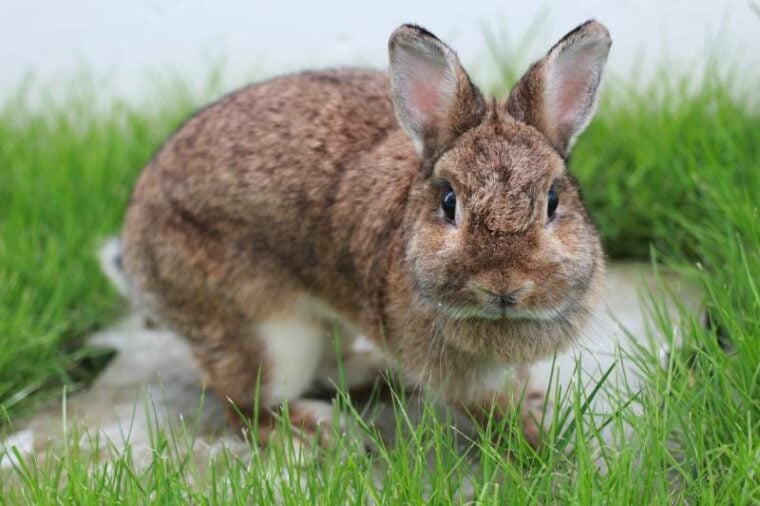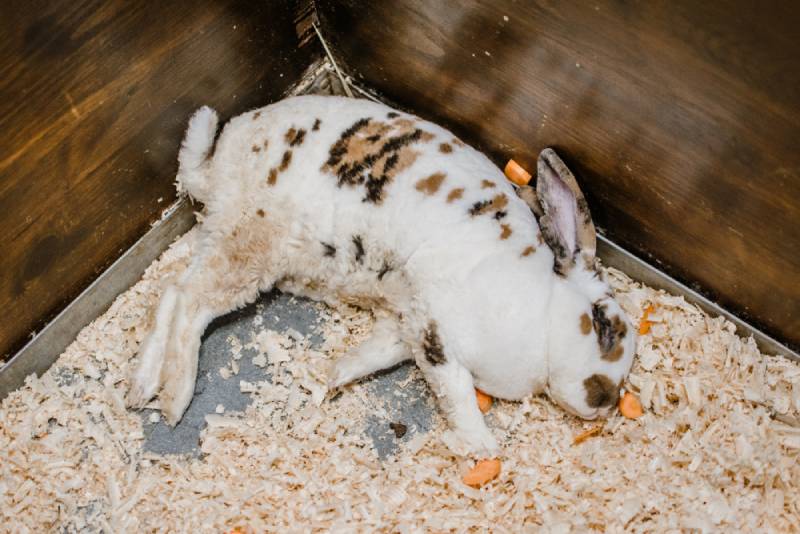
Rabbits breathe quite fast, so what can appear unusually rapid might be a normal respiratory rate for a rabbit. To put it into context, when a rabbit is at rest, they have a breathing rate of 30–60 breaths per minute, while a human will have only 12–16 breaths per minute. However, if this isn’t your first experience with a rabbit, and you have noticed they’re breathing faster than usual, or with more effort, you might wonder what the cause could be.
Most of the time, there is nothing to worry about. If your rabbit has been zooming about the room, it might be breathing so hard that its whole body is shaking. Sometimes, there are reasons that warrant a trip to the vet. So, let’s examine why your bunny might be breathing fast and if you should be worried.
The 8 Reasons Why My Rabbit Breathing Fast
1. Respiratory Infection
Pasteurellosis is commonly referred to as the “snuffles” because when rabbits are affected, they will make a snuffling breathing sound.1 Some milder signs that your rabbit has a respiratory infection are sneezing and nasal discharge. Also, keep an eye out for more severe signs, such as:

2. Secondhand Smoke
If your rabbit has a particularly sensitive respiratory tract, they might breathe fast if they have inhaled secondhand smoke. Tobacco contains 7,000 chemicals that are harmful to humans and pets, which might linger on surfaces, the air, clothing, furniture, and your pet’s fur. If you are a smoker, avoid smoking inside the house.
3. It’s Hot
If your rabbit is hot, it will breathe fast to help regulate its body temperature. This means the hotter they are, the faster they will breathe as their body tries to get rid of the excess body heat. If you suspect your rabbit is hot, move it to a cooler spot, as the hotter they get, the harder it is for them to regulate their temperature, and they are more susceptible to heatstroke.
4. Pain
If your rabbit is in pain, it will display it in very subtle ways because it’s a prey species. This can make it a little difficult to notice, but common signs of being in pain include:2
The reason for their pain can vary, from injuries to arthritis. Contact your vet immediately to get them checked over.

5. Stress and Fear
If your rabbit is feeling stressed or frightened, you might notice them hiding and exhibiting aggressive behaviors when they didn’t before. If you notice your rabbit’s behavior change out of the blue, contact your vet so they can help get to the bottom of why. Other signs that your rabbit is feeling stressed or frightened are:
6. Heart Disease
Rabbits can suffer from a range of different cardiac problems or abnormalities,2 and these can lead to rapid breathing. In some cases, fluid can accumulate in the lungs, causing the respiratory rate to increase to compensate. A reduced cardiac output will result in an increased respiratory rate due to the reduction in circulating oxygen.
Rabbits with cardiac disease can also show signs of lethargy, inappetence, collapse, or even sudden death.
7. Diarrhea
Diarrhea in rabbits is serious and is something you should never ignore; it’s important to ensure they pass solid pellets daily. When the digestive system is upset, your rabbit can get diarrhea, and it can be caused by:
You might notice other signs accompanying diarrhea, such as weight loss, a dirty bottom, bloating, lethargy, and shivering, but don’t wait for other signs to appear before going to the vet. If left untreated, diarrhea can become serious and even life-threatening. Additionally, taking a sample of your rabbit’s feces will be helpful to your vet.

8. Plant Poisoning
Your rabbit might be breathing fast to compensate for oxygen deprivation if they have eaten something they shouldn’t, like primrose, buttercups, nightshade, ivy, or mistletoe. If your rabbit gets to roam around near the garden, make sure they do so with supervision, and keep hazardous plants out of reach.
Frequently Asked Questions
Why Is My Rabbit Feeling Stressed?
Rabbits need access to certain things to be happy, like water, food, space, toys, toilet areas, and hiding places. If you don’t provide these for your rabbit, they’re more likely to feel stressed and anxious.
If you notice any behavior that is out of the ordinary, remember to treat your rabbit with kindness—don’t punish or shout at them, as they’re unlikely to understand why you’re angry and will only become scared and nervous. If your pet lives in a safe environment and is fed a healthy diet, you can take it to the veterinarian to determine why it’s still anxious and how to treat the condition.
Diarrhea or Caecotrophy?
Rabbits digest their food twice, which means they produce two types of feces, one of which can be mistaken for diarrhea.
It’s still a good idea to contact the vet if you suspect the feces you’re seeing isn’t diarrhea because rabbits stop eating their caecotrophs if something is wrong. So, either way, a trip to the vet for a checkup is in order.
How to Measure Your Rabbit’s Breathing Rate
If you want to measure your rabbit’s breathing rate, do it when they are relaxed and not when they’ve just finished running. You’ll need a timer or stopwatch, which you’ll set to 60 seconds. Carefully watch your rabbit for these 60 seconds and count how many times your rabbit inhales in that time. The answer will be your rabbit’s breathing rate.
Conclusion
Generally, there is little to worry about when it comes to your rabbit breathing fast. They breathe faster than humans in general and will breathe even faster if they have been exercising or playing. However, if you are worried or have noticed other concerning signs, contact your vet as soon as possible. Sometimes fast breathing can be a sign of stress or a respiratory illness, and the quicker you get your rabbit treated, the quicker they will return to normal.
Featured Image Credit: CART00N, Shutterstock










